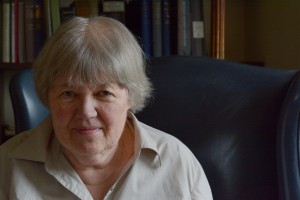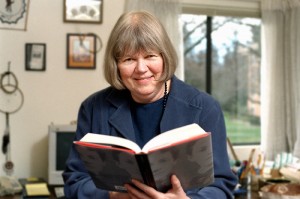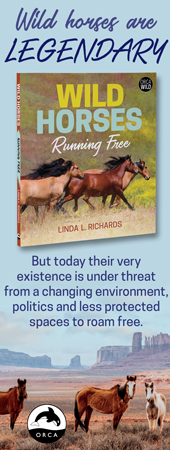Barman named 21st Woodcock winner
Jean Barman has devoted her life to uncovering the untold stories that conventional historians have overlooked. Her 21st book, French Canadians, Furs, and Indigenous Women in the Making of the Pacific Northwest, is due in August.
June 06th, 2014

"History is usually written by the winners," says indefatigable B.C. historian Jean Barman.
Jean Barman will receive the 21st annual George Woodcock Lifetime Achievement Award for an exemplary literary career at the central branch of the Vancouver Public Library on June 19 during a public ceremony at 7 p.m.
Co-sponsored by the Writers’ Trust of Canada and Dr. Yosef Wosk, the annual George Woodcock Lifetime Achievement Award is the province’s most prestigious literary honour. It recognizes a B.C. author whose outstanding literary career and contributions to society span several decades.
A $5,000 prize is presented to the recipient, whose name is added to the Writers Walk of Fame on the north plaza of Library Square in Vancouver.
“This award belongs to the many British Columbians who have over the years shared their stories and encouraged me to write them down,” says Barman.
Since her arrival in B.C. in 1971, Jean Barman has written and edited more than 20 books on the history of Canada, women and indigenous peoples, as well as the The West Beyond the West, currently the standard history of B.C. A recipient of the City of Vancouver Book Award in 2006 for her book Stanley Park’s Secret, Barman was also awarded the Lieutenant Governor’s Medal for Historical Writing in 2004 for Sojourning Sisters. She has also been active with the B.C. Heritage Trust and other historical organizations, and has been a catalyst for countless literary and historical projects by others. She has been inducted as a Fellow of the Royal Society of Canada in 2002 and was a recipient of the Queen Elizabeth II Diamond Jubilee Medal in 2012.
During the presentation ceremony in the Alice MacKay room at VPL, Barman will read from her forthcoming work, French Canadians, Furs, and Indigenous Women in the Making of the Pacific Northwest. For details about the event, visit VPL.ca/events.
As the 21st recipient of the Woodcock Award, Jean Barman will have her name added to the library’s Writers Walk of Fame on the north plaza of Library Square to join other authors such as W.P. Kinsella, Alice Munro, Jane Rule, David Suzuki, Eric Nicol, William New, Anne Cameron and fellow historian Chuck Davis.
Quotes about Jean Barman
Sandra Singh,VPL’s chief librarian
“We are pleased to be recognizing Jean Barman for her contributions to Canadian literature, history and heritage. Barman’s passion for highlighting ordinary lives and the lives of women who are not often documented in history is significant. She takes her honourable place among other luminaries who have shaped our province’s vibrant, literary culture.”
Howard White, publisher of Harbour Publishing:
“For the past two decades Jean Barman has been B.C. history’s most conspicuous advocate. Dr. Barman would deserve this recognition for the leadership and guidance she has provided to others even if she had not written over 20 exceptional books of her own.”
Lynn Copeland, former dean of libraries of Simon Fraser University:
“Together with her comprehensive history of B.C., Jean’s published works on little-known individuals and groups in B.C., and her early support for organizations such as the Chinese Canadian History Society of B.C., have helped provide a holistic picture of the province’s development for everyone in B.C.”
Mark Forsythe, host of CBC’s B.C. Almanac:
“Since I first met Jean Barman, I’ve come to appreciate how much her writing brings us stories of forgotten British Columbians. And Barman’s powers of persuasion have been influential for decades. She has prompted enough writing and history projects from others – myself included – to fill a book shelf. We are in her debt.”
About Jean Barman
“Turning lives into stories in no way reduces our obligation to take the past seriously.” — Jean Barman
Jean Barman’s The West Beyond The West: A History of British Columbia (1991), as one of the few comprehensive, modern histories of the province, has mostly replaced Margaret Ormsby’s work as the standard text on the subject.
In much of her work Barman has shown a predilection to examine the lives of women. Her biography of Constance Lindsay Skinner recalls the prolific journalist, born in B.C. in 1877, who managed to produce a wide range of poetry, plays, short stories, histories, reviews and children’s novels. Sojourning Sisters, for which she received the Lieutenant Governor’s Medal for historical writing, recalls the lives of two Scottish Presbyterian sisters who came from Nova Scotia in the late 1880s to teach. Because one of the sisters subsequently lived primarily in Ontario, they wrote more than 500 letters about their ‘sojourns’ that included stints in the Nicola Valley, Kamloops, Campbell Creek, Salmon Arm, Rossland, the Kootenays, Saltspring Island and Victoria. Barman has also paid tribute to the working class family of Portuguese Joe Silvey and the half-Hawaiian matriarch Mariah Mahoi, followed by Stanley Park’s Secret: Forgotten Families of Whoi Whoi, Kanaka Ranch, and Brockton Point (Harbour, 2005), a second volume that recovers the Hawaiian heritage of Canada’s West Coast. BC 150 Years (Harbour 2008) was nominated for the BC Booksellers’ Choice Award in Honour of Bill Duthie.
More than one thousand Hawaiians made the crossing the Pacific Northwest coast to mainly work within the fur trade prior to the formal annexation of the Hawaiian Islands by the United States in 1898, some making the sojourn more than once. Barman and Bruce McIntyre Watson of Vancouver rendered a comprehensive study and catalogue of Hawaiians and Polynesians in the Pacific Northwest in Leaving Paradise: Indigenous Hawaiians in the Pacific Northwest, 1787-1898. Among the immigrants was the unordained Christian missionary William Kaulehelehe, sent by his Hawaiian king in the 1840s to serve as “Chaplain to the Hawaiians in the Columbia.” His “Owhyhee Church” was torn down about 15 years later. The pious teacher was disheartened to discover he was mostly needed to arbitrate disputes among the Kanakas, many of whom preferred to work or drink on the Sabbath. “The Hawaiians have repeatedly and daily asked me to see about their trouble of being repeatedly abused by the white people without just cause,” he wrote. In 1862, Kaulehelehe came to Fort Victoria where he worked as a Hudson’s Bay Company clerk and translator. He and his wife lived on Humboldt Street, an area known as Kanaka Row. He was buried in Ross Bay Cemetery in 1874.
Hardly anyone realizes it, and nobody has made it public knowledge, but for half-a-century, French Canadians were the largest group of newcomers west of the Rockies. Ironically, in a place later to be called British Columbia, it was mainly francophones who facilitated the early overland crossings into the Pacific Northwest. It was francophones who chiefly drove the fur economy, initiating non-wholly-indigenous agricultural settlement and easing relations with indigenous peoples. The largely unsung work of these men–often in league with Scots–ensured that, when the region was divided in 1846, the northern half would go to Britain, giving Canada its Pacific shoreline. In Jean Barman’s ground-breaking French Canadians, Furs, and Indigenous Women in the Making of the Pacific Northwest (UBC Press 2014), she rewrites the history of the Pacific Northwest from the perspective of these little-known French Canadians, emphasizing the role that indigenous women played in encouraging them to stay, and identifying their descendants.
A UBC historian in the Department of Educational Studies, Jean Barman was born in Stephen, Minnesota. In keeping with her position in the Education department at UBC, her first book about B.C. was Growing Up British in British Columbia: Boys in Private School. She also co-edited Vancouver Past: Essays in Social History with UBC history professor Robert A.J. McDonald; Indian Education in Canada, with Don McCaskill and Yvonne Hebert; and First Nations Education in Canada: The Circle Unfolds, with Marie Battiste, a member of the Mi’kmaq Nation. With Linda Hale she co-produced a 1991 bibliography of B.C.’s local history books for B.C. Heritage Trust which included 800 communities. Jean Barman is married to historian Roderick Barman. They live in Vancouver.
Books
- French Canadians, Furs, and Indigenous Women in the Making of the Pacific Northwest (UBC Press, 2014)
- Edited with Cheryl Suzack, Shari M. Huhndorf and Jeanne Perreault, Indigenous Women and Feminism: Politics, Activism, Culture (UBC Press, 2011)
- BC 150 Years: Spirit of the People (Harbour, 2008)
- The West beyond the West: A History of British Columbia (Revised edition. University of Toronto Press, 2007, 1996, orig., 1991)
- With Jan Hare, Good Intentions Gone Awry: Emma Crosby and the Methodist Mission on the Northwest Coast (UBC Press, 2006)
- With Bruce McIntyre Watson, Leaving Paradise: Indigenous Hawaiians in the Pacific Northwest, 1787-1898 (University of Hawaii Press, 2006)
- Stanley Park Secrets: The Forgotten Families of Whoi Whoi, Kanaka Ranch, and Brockton Point (Harbour, 2005)
- The Remarkable Adventures of Portuguese Joe Silvey (Harbour, 2004)
- Maria Mahoi of the Islands (New Star, 2004)
- Edited with Mona Gleason, Children, Teachers and Schools in the History of British Columbia (2nd ed. Detselig, 2003)
- Sojourning Sisters: The Lives and Letters of Jessie and Annie McQueen (University of Toronto Press, 2003)
- Constance Lindsay Skinner: Writing on the Frontier (University of Toronto Press, 2002)
- Edited with Marie Battiste, First Nations Education in Canada: The Circle Unfolds (UBC Press, 1995)
- Edited with Neil Sutherland and J. Donald Wilson, Children, Teachers and Schools in the History of British Columbia (Detselig, 1995)
- Edited with Neil Sutherland and Linda Hale, Contemporary Canadian Childhood and Youth: A Bibliography and History of Canadian Childhood and Youth: A Bibliography (Greenwood Press, 1992)
- With Linda Hale, British Columbia Local Histories: A Bibliography (British Columbia Heritage Trust, 1991)
- History of British Columbia (Open University, 1991, revised 1997)
- Edited with Robert A.J. McDonald and Jill Wade, Readings in the History of British Columbia (Open Learning Agency, 1989; 1997)
- Edited with Yvonne Hébert and Don McCaskill, Indian Education in Canada. Vol l: The Legacy and vol. 2: The Challenge (UBC Press, 1986 and 1987)
- Edited with R.A.J. McDonald, Vancouver Past: Essays in Social History (UBC Press, 1986)
- Growing Up British in British Columbia: Boys in Private School (UBC Press, 1984)
Award Highlights
- Queen Elizabeth II Diamond Jubilee Medal, 2012
- Canadian Women’s Studies Association Outstanding Scholarship Prize, 2012
- Canadian Historical Association Prize, 1992, 2004, 2006 and 2009
- City of Vancouver Book Award, 2006
- B.C. Historical Federation Best Article Award, 2005
- Lieutenant Governor’s Medal for Historical Writing, 2004
- Vancouver Historical Society Award of Merit, 2003
- Fellow of the Royal Society of Canada, elected 2002
- Washington State Historical Society Charles Gates Award, 2000
- Western History Association Jensen-Miller Award, 1999
- UBC Killam Teaching Prize, 1996
- Canadian History of Education Association Founders’ Prize, 1992-93, 1989
**********
View the news release for details about the special presentation on June 19 at VPL’s central library.
About Vancouver Public Library
Vancouver Public Library has been dedicated to meeting the lifelong learning, reading and information needs of Vancouver residents for more than 100 years. Our vision is an informed, engaged, and connected city. Our mission is a free place for everyone to discover, create and share ideas and information. Last year, VPL had more than 6.9 million visits with patrons borrowing more than 9.5 million items including: books, ebooks, CDs, DVDs and magazines. Across 22 locations and online, VPL serves nearly 428,000 active members and is the third-largest public library system in Canada.
VPL is online at VPL.ca, Twitter (@VPL) and Facebook (VancouverPublicLibrary).
[photos of Jean Barman by Laura Sawchuk and Martin Dee]



Well-deserved recognition for a woman who has taken BC history as her cause and done more for it than anyone before her. Even if she had not deserved the Lifetime Achievement award for her many excellent books, she would deserve it for the mentoring and encouraging she has provided to everyone else in the field, from local history groups to PhD candidates.